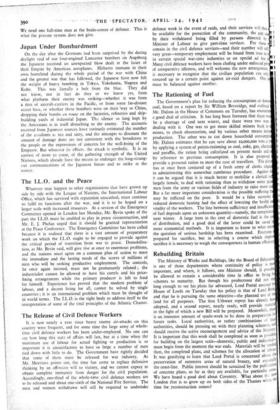The I.L.O. and the Peace
Whatever may happen to other organisations that have grown up side by side with the League of Nations, the International Labour Office, which has survived with reputation unscathed, must continue to fulfil its functions after the war, and it is to be hoped on a larger scale with increased resources. At a session of the Emergency Committee opened in London last Monday, Mr. Bevin spoke of the part the I.L.O. must be enabled to play in peace reconstruction, and Mr. E. J. Phelan urged that it should be granted representation at the Peace Conference. The Emergency Committee has been called because it is realised that there is a vast amount of preparatory work on which the I.L.O. ought to be engaged to provide against the critical period of transition from war to peace. Demobilisa- tion, as Mr. Bevin said, will give rise at once to enormous problems, and the nations must agree on a common plan of action to meet the immediate and the lasting needs of the scores of millions of men who will be seeking productive employment. The controls, he once again insisted, must not be prematurely relaxed ; the industrialist cannot be allowed to have his cartels and his price- fixing arrangements while the primary producer is left to fend for himself. Experience has proved that the modern problem of labour, and a decent living for all, cannot be solved by single countries ; it is an international problem which must be thought of in world terms. The I.L.O. is the right body to address itself to the interpretation of some of the vital principles of the Atlantic Charter.






















 Previous page
Previous page